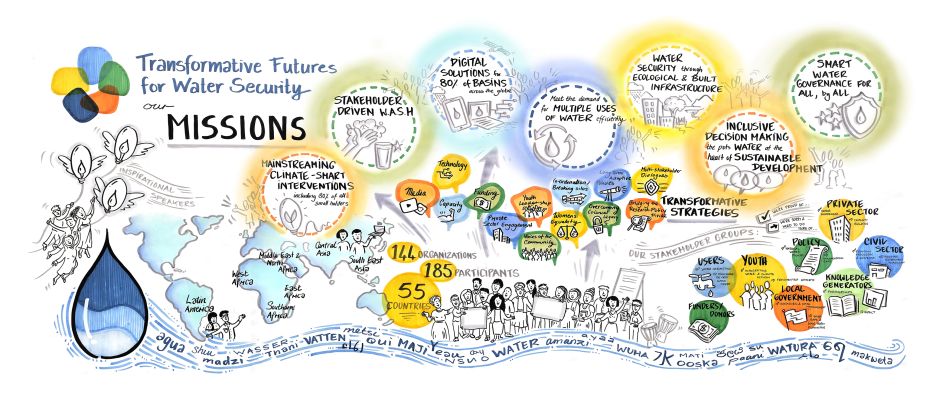By Raunak Shrestha & Radheeka Jirasinha
Achieving water security is a multi-faceted and multi-generational challenge that will require systemic and inclusive solutions. With more than 15% of the global population being between the age of 18-30, youth present a powerful force for water action. However, studies have indicated that water and water-related initiatives are at risk because they fail to attract young professionals and leverage their contributions. Given the complexity of the water crisis, and the scale of global water ambitions, the world cannot afford to exclude contributions from the youth.
“Youth” is one of the labels for young professionals through which they are dominantly viewed as advocates and activists, but they are primarily researchers, hydrologists, economists, project managers, community mobilizers, entrepreneurs, educators, among many others. Yet young professionals are provided a seat at the “kids’ table”.

In reality, the same young professionals can make contributions to thematic areas usually considered beyond their scope, such as irrigation, finance, sanitation or hydrology, among others. Young professionals are positioned to actively learn from leaders and decision makers while also contributing to institutional and global missions. Many examples of meaningful youth engagement have already been well documented, and it clarifies that youth engagement and inclusion will require more cross cutting integration and a transition from solely consultative processes to collaborative processes where youth contributions are valued and recognized.
Initiatives such as Transformative Futures for Water Security (TFWS) takes a collaborative approach with youth while also recognizing that it is not sustainable or fair to have conversations on the future of water without having the perspective and ownership of future generations. Through the concept of youth co-guardianship, young professionals were given the opportunity to co-design the TFWS multi-stakeholder process and given the responsibility of implementing the process along with other professionals in the field. The multi-stakeholder process brought together a range of different stakeholder groups that may not commonly engage with one another. This allowed for discourse on the formulation of eight high-ambition missions and associated mission driven alliances. Furthermore, the process was unconventional as they were driven by the participants, co-led by youth. A takeaway from this was that transformative processes will require greater inclusion, meaningful discourse and youth playing a central role as facilitators and contributors.

Water security requires youth as actors and contributors
The institutional responsibility of youth inclusion and investment does not only lie in the work that an organization implements. It also lies in their own functioning that paves the way for young professionals to meaningfully co-create and contribute to the larger mission and vision of a water secure world. Setting up spaces such as the Early Career Researcher Forum (ECRF) within the International Water Management Institute (IWMI), allows for peer-to-peer support but also more inter-generational dialogue and mentorship. These communities support the growth of early career professionals but also foster an environment for collaboration where individuals are more likely to pay it forward to future generations entering the water workforce.
The ECRF brings together diverse individuals from a wide range of disciplines to share knowledge, skills, and experiences, identify challenges and needs, as well as opportunities for innovation and collaborative research, both in their work and within the functioning of the organization. The ECRF consists of those who are in the early years of their research career which includes young professionals and those who identify as early career, whether it be individuals experiencing a career change or re-joining after a career break. Within the first year of its launch the ECRF has generated spaces for skill development, mentorship, and advancing knowledge. A key highlight is that ECRF members are seated at the non-kid tables or working groups for organizational growth across IWMI. Through this process early career professionals are collaborating with leaders and decision makers in areas of resource mobilization, partnerships, systems, workforce development and culture, among other aspects, to strengthen organizational resilience and research for development impact.
Young professionals have been voluntarily organizing themselves to strengthen themselves as allies, advocates, decision makers and actors in the water space through movements such as Global Youth Movement for Water as well as youth-led organizations such as World Youth Parliament for Water, Water Youth Network, and Youth and Young Water Professionals and they have been successful in forming strong partnerships with leading water institutions such as that illustrated in TFWS. As we strive to achieve a water secure world, the key principle of sustainability with inter- and intra-generational equity must be held at the core of collective action. It will require a transition in perspectives for youth to be regarded as actors and contributors rather than just the future generation. Harnessing the power of youth will require the investment in youth through initiatives such as incubation and innovation, systemic inclusion of youth in co-creation processes such as TFWS, and inclusion in institutional systems such as the ECRF.





